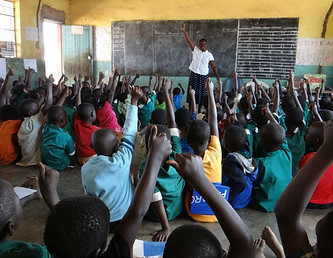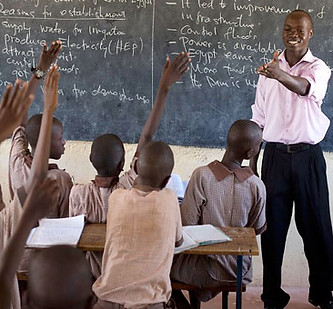Speakers
January 16, 2018
-
Tom Beresford, Innovation Unit
-
Katherine Crisp, UNICEF UK
-
Paula Valverde Revuelta, ProFuturo
-
Andrew Cunningham, Aga Khan Foundation

WEEK 1 | Can we do more with technology t0 improve learning outcomes? Insights from 16 countries in Eastern, Western, Central and Southern Africa

WEEK 2 | From development to vitalisation: multiliteracies research with deaf communinities in India
January 23, 2018
-
Professor Ulrike Zeshan, Central Lancashire

WEEK 3 | Can schools' accountability for learning be strengthened from the grassroots? Investigating the potential for community school partnership in India
January 30, 2018
-
Dr. Ben Alcott, Cambridge University

WEEK 4 | Examining early development and school readiness of children with disabilities in Malawi through a bio-ecological systems theory
February 6, 2018
-
Professor Lynch, Birmingham University

WEEK 5 | Education and aspiration in rural Lesotho, India, and Laos
February 13, 2018
-
Professor Nicola Ansell, Brunel University

WEEK 6 | Are children with disabilities in school learning? Evidence from India and Pakistan
February 20, 2018
-
Professor Pauline Rose, Cambridge University

WEEK 7A | Teaching for critical thinking: pedagogical innovation at universities in Kenya, Ghana and Botswana
February 27, 2018
-
Professor Rebecca Schendel, UCL

WEEK 7B | Teacher Transformation for Learning Inspiration: A Review of Global Models of Instructional Design and School Improvement
March 2, 2018
-
Margery Evans, Aga Khan Education Services
-
Steven Farr, Global Learning Lab
-
Keren Caple, Innovation Unit
-
Jane Ehrenfeld, Centre for Inspired Teaching
-
Sharath Jeeven, STIR Education

WEEK 8 | Challenges of monolingual and multilingual education: cognition, numeracy, and literacy skills in primary school children in India
March 6, 2018
-
Professor Ianthi Tsimpli, Cambridge University

Oxford Comparative and International Education Seminar Series
Raising Learning Outcomes in the Education Systems of Developing Countries
Department of Education | St. Antony's College | University of Oxford
Hilary Term | January - March
Supported by the ESRC, DFID, and Aga Khan Foundation
Despite the advances made in securing access to education for many more children around the world than was the case a decade ago, large numbers still do not have access to formal education; and where they do, many are not learning at all, or learning fast enough to make successful transitions through the education system.
And while there is a concerted effort to redress the learning gap, and indeed the learning divide, our understandings of those policies and interventions that are most likely to lead to improvements in learning for all, especially for the more disadvantaged learners remains partial.
So, how might we improve our understanding of what works to raise learning outcomes for all?
The ESRC-DFID Raising Learning Outcomes in Education Systems Research Programme consists of a portfolio of 29 interdisciplinary research teams, each that undertakes cutting edge research on the manner in which the complex relationships between elements of the education system, the contexts in which they are embedded, and the dynamics operating within the system impact on efforts to raise learning outcomes for all.
This seminar series, organised by the ESRC-DFID Programme Research Lead brings together researchers from across the portfolio of research grants to present their questions, their thinking, and their learning.
Seminars will be given at 5pm on Tuesdays in the Syndicate Room, St Antony’s College.
Conveners: David Johnson, Bronwen Magrath, Monazza Aslam, Andrew Cunningham
For more details, please contact prl@education.ox.ac.uk
Topics

All seminars are live streamed via Facebook Live Feed to increase the accessibility of the intellectual discourse guiding current debates in comparative and international education at local, national, and global levels. Please join us live at 5:00 PM GMT and provide comments to be offered during the seminar. You can also browse all previously recorded seminars on the Facebook page. Please click below to find out more.
